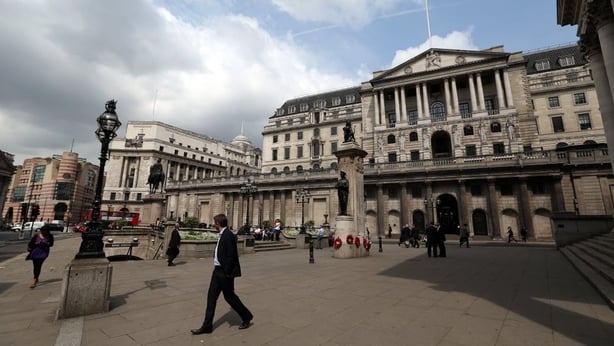The Bank of England has slightly lowered its outlook for UK economic growth this year to 2.7%, from the previous figure of 2.8%.
The bank also gave no sign that it was in any more of a hurry to raise interest rates, predicting near-zero inflation would pick up only slowly even if borrowing costs stay on hold all of next year.
Its tone contrasts with that of the US Federal Reserve, whose chair, Janet Yellen, said yesterday that a US rate rise was a prospect for December.
Only one Bank of England policymaker, Ian McCafferty, voted to raise interest rates this month, while the other eight members of the Monetary Policy Committee opted to keep them at a record-low 0.5%, where they have been since March 2009.
The Bank of England trimmed its forecast for economic growth for this year and 2016 and warned emerging markets could get stuck in a rut of slower growth.
"The outlook for global growth has weakened since the August Inflation Report," the BoE said in its quarterly forecast update.
"There remain downside risks to this outlook, including that of a more abrupt slowdown in emerging economies," it added.
The UK central bank also announced it would continue to reinvest the proceeds of bonds maturing from the £375 billion of quantitative easing assets that it bought to spur growth until it had raised interest rates to around 2%.
The Bank of England message on inflation may surprise investors, who in recent days moved to price in a rate rise at the end of next year. That was sooner than bets held until late last month that a first move would not come until the first half of 2017.
It was this latter expectation that the BoE used as a working assumption in its forecast update, which predicts that inflation - currently below zero - would nudge above 2% in two years' time.

Economists have said they expect a first interest rate rise by the BoE in the second quarter of 2016, according to the average forecast in a Reuters poll.
The Bank of England said inflation was likely to stay below 1% until the second half of 2016, due overwhelmingly to lower costs for energy, food and other imports.
The slow pick-up in inflation comes despite relatively robust growth forecasts.
Growth is seen at 2.7% this year, 2.5% in 2016 and 2.7% in 2017, only a whisker weaker over the three-year period than the bank predicted in August and above most economists' expectations.
But the warning on emerging markets may in part reflect the concerns of the BoE's chief economist, Andy Haldane, who recently warned that China's sharp stock market falls could prove the start of a third act of the global financial crisis which started in 2008.
Minutes of the MPC's discussion this month showed there was "a wide spread of views" about the outlook for growth, inflation and the impact of the slowdown in emerging markets.
next year.

